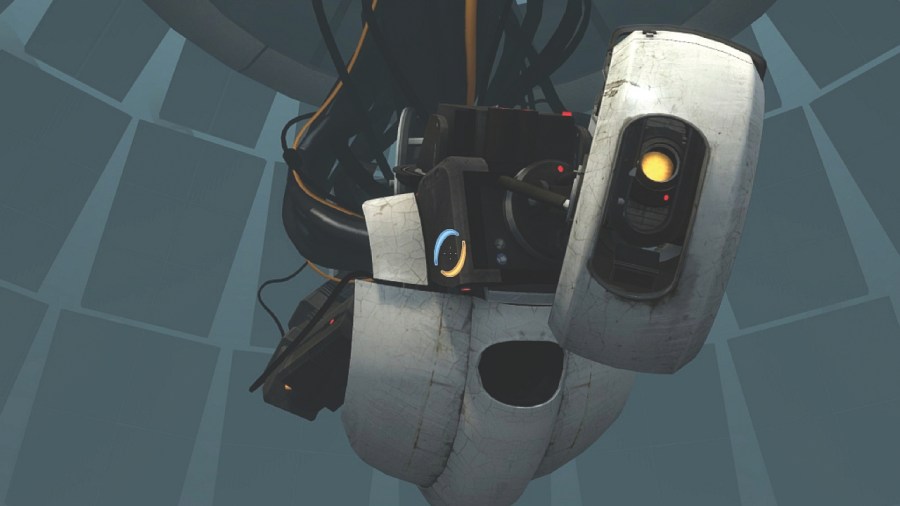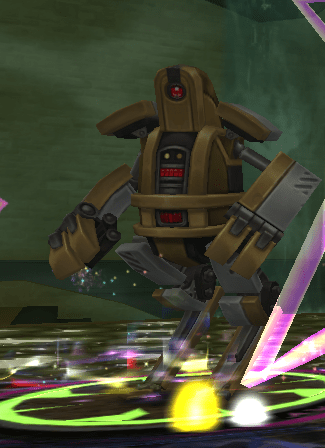Huuver – Hoover Vacuum Cleaner Company and GLaDOS from Portal
https://wiki.wizard101central.com/wiki/Creature:Huuver
https://en.wikipedia.org/wiki/The_Hoover_Company
https://en.wikipedia.org/wiki/GLaDOS
Huuver is a sanitation bot that lives in the Zanadu Sewers. Sani-bots are programmed to keep the sewer clear of Shadow creatures. However, their mechanical minds do not know how to interpret the signals from Bat’s machine, so they go mad.
“Darkness! Everywhere Darkness! How can we clean over so much Darkness?” – Huuver
MONSTROLOGY TOME DESCRIPTION: An early model Sani-Bot. It needs to stay plugged in or it loses charge rapidly.
The Hoover Company is a home appliance company founded in Ohio, United States, in 1915. It also established a major base in the United Kingdom; and, mostly in the 20th century, it dominated the electric vacuum cleaner industry, to the point where the Hoover brand name became synonymous with vacuum cleaners and vacuuming in the United Kingdom and Ireland. Hoover North America was once part of Maytag, but was sold by Maytag’s new owners Whirlpool Corporation in 2007 to Hong Kong multinational manufacturing company Techtronic Industries for $107 million. Hoover International had already split from Hoover North America in 1993, and was acquired by Candy in 1995, which was acquired by Haier in 2019.
The first upright vacuum cleaner was invented in June 1908 in North Canton, Ohio by department store janitor and occasional inventor James Murray Spangler. Spangler was an asthmatic, and suspecting the carpet sweeper he was using at work was the cause of his ailment, he created a basic suction-sweeper by mounting an electric fan motor on a carpet sweeper and then adding a soap box and a broom handle. After refining the design and obtaining a patent for the Electric Suction Sweeper he set about producing it himself, assisted by his son, who helped him assemble the machines, and his daughter, who assembled the dust bags. Production was slow, completing just two to three machines a week.
Spangler soon gave one of his Electric Suction Sweepers to his cousin Susan Troxel Hoover, who used it at home. Impressed with the machine, she told her husband and son about it. William Henry “Boss” Hoover and son Herbert William Hoover Sr. were leather goods manufacturers in North Canton, Ohio, which at the time was called New Berlin. Hoover bought the patent from Spangler later that same year, founding the Electric Suction Sweeper Company for an initial capital investment of $36,000 ($1,220,800 today), retaining Spangler as production supervisor with pay based on royalties in the new business. Spangler continued to contribute to the company, patenting numerous further Suction Sweeper designs until his death in 1915, when the company name was changed to the Hoover Suction Sweeper Company, with Spangler’s family continuing to receive royalties from his original patent until 1925.
GLaDOS (Genetic Lifeform and Disk Operating System) is a fictional character from the video game series Portal. The character was created by Erik Wolpaw and Kim Swift and voiced by Ellen McLain. GLaDOS is depicted in the series as an artificially superintelligent computer system responsible for testing and maintenance in the Aperture Science Computer-Aided Enrichment Center in all titles. While GLaDOS initially appears in the first game to simply be a voice that guides the player, her words and actions become increasingly malicious as she makes her intentions clear. The second game, as well as the Valve-created comic Lab Rat, reveals that she was mistreated by the scientists and used a neurotoxin to kill the scientists in the laboratory before the events of the first Portal. She is apparently destroyed at the end of the first game but returns in the sequel, in which she is supplanted by her former intelligence dampener and temporarily stuck on a potato battery, while her past as the human Caroline is also explored.

The inspiration for the character’s creation extends from Wolpaw’s use of a text-to-speech program while writing lines for the video game Psychonauts. Other game developers working on Psychonauts found the lines funnier as a result of the synthesized voice. GLaDOS was originally intended to be present solely in the first area of Portal; she was well received by other designers and her role was expanded as a result. Play testers were motivated to complete tests in the game due to her guidance. While the game was initially designed with other characters, they were later removed, leaving GLaDOS as the only character players encounter. The physical appearance of GLaDOS went through several designs, one of which featured a large disk below her. McLain imitated dialog read aloud by a speech synthesizer with her own voice, which was then processed to sound more robotic, and performed songs in character during the closing credits of both entries in the series. “Still Alive” became hugely successful, notably appearing in the Rock Band game series, and has been a popular song for YouTube users to cover. GLaDOS later appeared in The Lab and Lego Dimensions.
The current list of all the (known) Empyrea references can be found here.
Although I am well versed in Pop Culture references but I do not claim to have caught them all. Let me know your favorites in the comments and if I’ve missed one you caught, let me know so I can add it to the list.
Text for this article is excerpted from the linked wiki pages
Huuver image is from Wizard101, and is copyright of KingsIsle Entertainment.
The Hoover logo is borrowed from Wikipedia and is TM and copyright The Hoover Company.
1908 Hoover vacuum cleaner image is borrowed from the National Museum of American History website and is copyright The Hoover Company, thru H. E. Buker. It is shared under the CC0 Creative Commons license.
GLaDOS image is borrowed from Gamesradar.com and is copyright Microsoft Game Studios.
Image usage qualifies as fair use under US copyright law.


